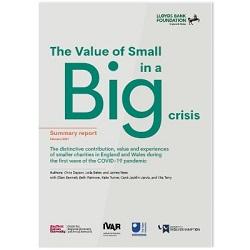All news and blog posts

A practical guide on ‘Becoming a Barrister’
Dr Emma Jones (an Associate Lecturer and a previous OU Teaching Director for Law who is now at the University of Sheffield) and Senior Lecturer in Law Dr Neil Graffin have helped co-author a suite of free online resources with The Inner Temple.

The post-Brexit amendment to Public Procurement Law: transformative or unchanged provisions?
Dr Miriam Mbah, OU Lecturer in Law, responds to the UK Government Green Paper on Transforming public procurement in December 2020.

The value of small and local charities …. in a big crisis
The Business Schools Centre for Voluntary Sector Leadership (CVSL) is part of a research team, funded by the Lloyds Bank Foundation for England and Wales, which has launched The Value of Small in a Big Crisis report.

OUBS expert speaks to House of Lords Covid-19 Committee’s inquiry
Dr Jamie Woodcock made several recommendations when he was invited to give oral evidence at the House of Lords Covid-19 Committee inquiry.

International Women's Day
To support International Women’s Day we have put together a number of resources, including events and news articles for women’s rights.

How much fuel does it take to send crypto to the moooonn?
Elon Musk, CEO of Tesla, has been at it again. At what, exactly? He’s using his not insignificant social media presence (46.5 million followers) to endorse cryptocurrencies, notably Bitcoin and Dogecoin, helping to drive their price and value up, up, and away.

Mars: how scientists prevent Earth’s microbes from contaminating other planets
Thomas Cheney is Lecturer in Space Governance within AstrobiologyOU, at The Open University. He is active in researching space law, policy and governance and his research focuses on planetary protection and environmental aspects of space governance, as well as space resources and property rights.

“I’m not a cat”, or, the joy of metamorphosis?
The video of lawyer, Rod Ponton, trapped in the online avatar of a cute kitten, earnestly imploring the judge of the 394th Judicial District Court in Texas, Roy B. Ferguson, that he is “not a cat”, is at once the funniest and most deeply affective Zoom Age moment.

Researching the impact of Covid-19 on the future workplace
Dr Hilary Collins, a Senior Lecturer in Corporate Programmes for Executive Education, has received £7,500 to assess the impact of the pandemic on Continuing Professional Development (CPD) requirements for organisational development in the UK.

“We do good things, don’t we?”: considerations about social enterprises’ evaluation approaches
This blog is written by Dr Francesca Calo, Lecturer in Management at The Open University Business School (OUBS). This blog was originally published on 2 February 2021 and was written for the OUBS Department of Public Leadership and Social Enterprise (PuLSE) blog.